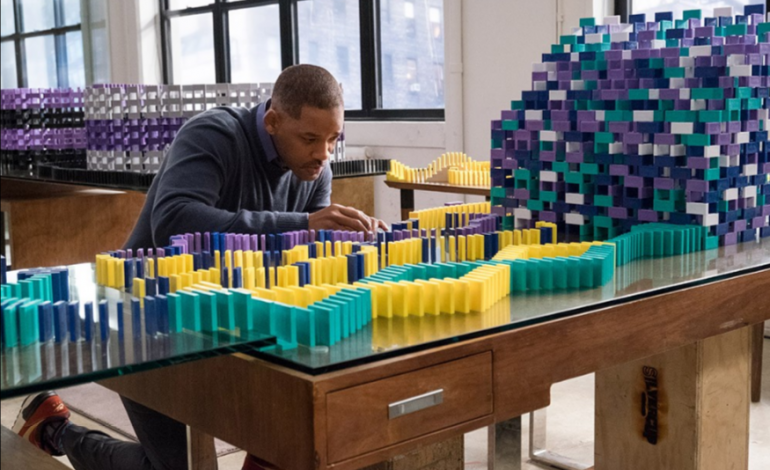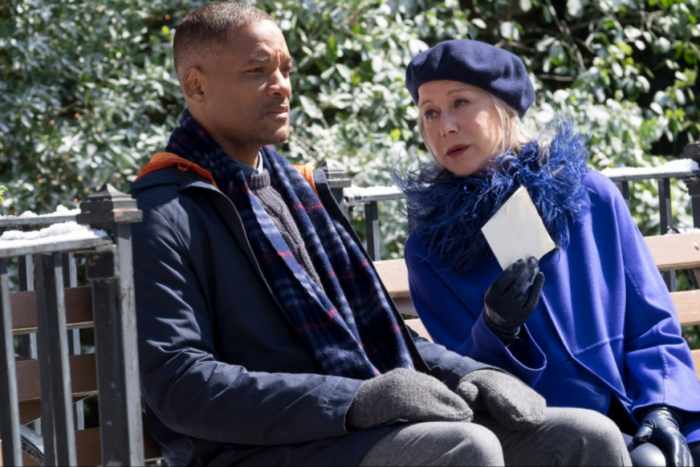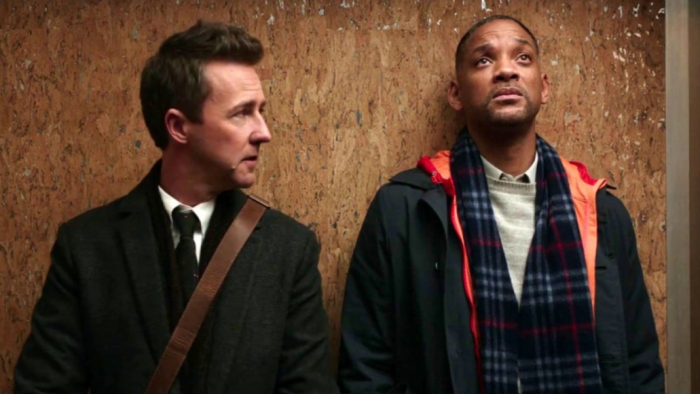

The big holiday tearjerker of 2016 is Collateral Beauty starring Will Smith as Howard, a man who has a nervous breakdown following the death of his daughter and ends up meeting the abstract concepts of Time, Death, and Love. Or does he? (He does.) Will it make you cry? Well, that depends on your constitution, but due to a convoluted plot (and/or your own personal cynicism), probably not.
Anyone who has seen the ads for Collateral Beauty may be under the impression that Will Smith regularly interacts with three ethereal concepts. And he does. However, the majority of the movie tries to convince us that that isn’t actually the case, until the end when we learn that it is actually is the case. Can you watch the movie as presented without applying your foreknowledge of the “twist?” Obviously we all watch movies after knowing/guessing their twist (especially one as obvious as this one’s is), but the disconnect significantly harms Collateral Beauty. It’s a movie pitched as being full of miracles and wonders, but all you want is for them to come out with the reveal so it can get to the real (well, ersatz) “heart” of the story.
So if this movie isn’t “supposed” to be about a man who meets abstract concepts, then what is it? Yes, Will Smith’s Howard has a nervous breakdown after the death of his daughter – that much is true. However, the actual premise is that Howard’s business partners (played by Michael Peña, Kate Winslet, and Edward Norton) need to convince him he’s mentally incompetent and must relinquish shares of his advertising agency in order to sell it to a buyer at a greatly inflated price. So Norton’s character hires a struggling acting troupe (Helen Mirren, Keira Knightly, and Jacob Latimore as Death, Love, and Time, respectively, and collectively, “the Abstractions”) to pretend to be these concepts in order to convince Howard that he’s insane (and/or get him out of his funk). It’s certainly the makings for the feel-good hit of the winter!
To be fair, this isn’t a Mr. Deeds situation. The movie does a painstaking job ensuring that we don’t see the business partners as bad people. The business is failing because Howard is unable to do anything but build incredibly intricate domino rallies (that symbolize something, I guess), and since he’s the creative genius plus the person the clients love, with him checked out, the business is going to fail. Plus, the buyer promises that everyone would keep their job! (They’re doing this for the greater good!) Plus, the three main characters are dealing with their own issues: critical illness, the estrangement of a daughter following a divorce, and the winding down of a biological clock. (In other words, Death, Love, and Time.) That certainly makes their gaslighting of Howard (and they specifically use that term in the movie) okay!
If the movie has one strong point, it’s the acting; the entire cast does a mostly terrific job. I’ve never been the biggest fan of Will Smith’s “Will Smithing,” and his attempts at drama are hit or miss (with misses including Seven Pounds and After Earth), but he’s genuinely good here. He sells his pain as a man completely broken by the lost of his child, and bits of the “Will Smith” come through when necessary (e.g. the “Death is an elderly white woman” line shown in the majority of the ads), offering a decent contrast to who Howard is now; you kind of wish there was more to the character though than endless bouts of crying and anger. The supporting cast also provides an appropriate level of heart and humanity. Relative newcomer Jacob Latimore as Time holds his own against Oscar favorites, while Michael Peña (probably best known as Ant-Man’s best pal, Luis) continues to shine in pretty much everything he does.
Unfortunately, good performances aside, it’s exceedingly difficult to get past the plot – with or without our pre-existing expectations/knowledge. It’s hard to side with Howard when we see how his grief is ruining the lives of everyone around him, and it’s hard to side with his business partners/friends when they’re actively messing with his sanity. Their own personal tragedies are further attempts to cushion the blow, but being devoid of subtlety, these plot points come across as nothing but more tries at browbeating the audience into submission. Writer Allan Loeb (Adam Sandler’s Just Go With It, Oliver Stone’s Wall Street: Money Never Sleeps, the upcoming The Space Between Us) and director David Frankel (The Devil Wears Prada, Marley & Me) try to minimize the cynicism of the actual plot (again – it’s people convincing their friend he’s insane in order to keep their business), but you can never ignore the harshness of what they are trying to do. This makes any attempts at humor and whimsy ring horribly false. For a film purporting to be about finding the magic all around us, it does a poor job of convincing us about the beauty in the center, let alone on the fringes. (And for a movie set in New York during Christmas, it really fails to take advantage of that iconic setting. Aside from a couple of Christmas trees, it could easily take place during a moderately cold fall. I mean look at the picture below, is that Christmas-wear?)
As with many twist-dependent movies, you’re apt to go back and figure how it logically comes together. However, because you know what Collateral Beauty is actually about, you spend most of the movie instinctively factoring in the twist – and it does not hold up. Are we supposed to see the Abstractions as their ‘abstractions’ or as their ‘actor-characters’? Is Love pleading with Howard through her tears over his abandonment of ‘it’ how Love really feels (i.e. is it genuinely hurt?), or is it an acting choice? Is Death offering to play the other two ‘Abstractions’ an actual desire, or is it her messing with her patrons? When we see cell phone footage of Howard arguing with ‘no one’ on the street, is he actually arguing with ‘no one,’ or is it part of incredibly well done effects by the private investigator in on the scheme whom the business partners hired to follow Howard? (And I mean, incredibly well done – in one instance, we actually see a person walking ‘towards’ where the Abstraction is supposed to be. Did they hire/re-hire the walker to really sell the footage? Or was Howard actually talking to no one? If there was no one, wouldn’t the person taking the footage bring up these concerns to Howard’s supposed friends? If the Abstractions were there, who did such a fantastic job editing the footage? And the sound quality is second to none.)
But maybe that’s the wrong way to see this movie; it’s supposed to aim at the heart, not the mind. But it’s hard to remove the mind from the equation when you go in not just knowing, but being sold the twist. If the movie truly indulged its fantastical elements and kept us in on the gag from the start (while leaving the characters mostly ignorant), and really considered how the ultimate twist would play, the movie might have been effective on the performances alone. By trying to keep us in the dark, Collateral Beauty ends up losing its impact and becoming a muddled mess.
Verdict: 2 out of 5
Despite the strength of the performances, Collateral Beauty is hamstrung by the myriad of flaws with its premise, its execution, and the marketing campaign. It’s not the Love Actually tearjerker it clearly wants to be, but it attempts to fill a niche (for less discerning audiences) otherwise missing this holiday season – if you can overlook the (im)moral quagmire that looms over everything. (Though if you want a movie with genuine emotional oomph, there’s still Manchester by the Sea and Arrival.)


